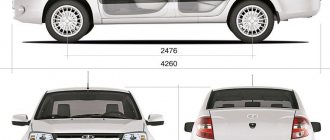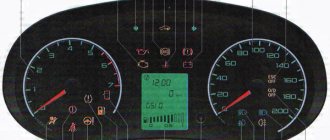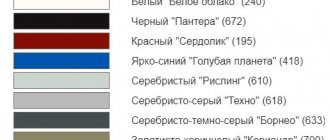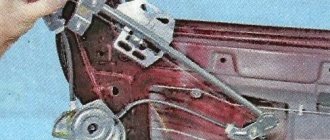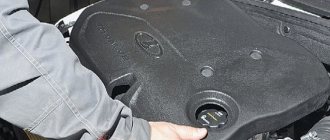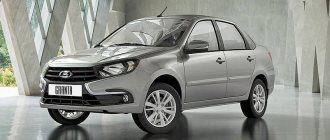One manufacturer, one platform... Besides the nameplates, how do Lada Granta and Datsun on-DO differ from each other?
How much?
Marketers tried very hard to separate the cars. Let's say a 106 hp engine. it is not provided for on-DO, and it only has a five-speed manual gearbox.
Nevertheless, the cars overlap in price. Granta at the end of 2015 cost 368,900–527,000 rubles, and on-DO was sold for 406,000–522,000 rubles. That is, the expensive Granta costs the same as a cheap Datsun with the same power unit (1.6 l, 87 hp, manual transmission).
What is the difference between the Datsun on-Do and the Lada Granta?
Naturally, when comparing the appearance, design, and general “prestige” with the Japanese model, most ordinary people do not choose the domestic Grant. And no admonitions that it is He-Do that is copied from Granta, and that Datsun is not such a prestigious brand, will help here. Datsun is positioned as a car with Japanese “DNA”, because indeed, Japanese Nissan engineers took part in refining and improving Grant developments so that Datsun would be of better quality, more comfortable and more reliable. Therefore, this round is completely for him-Do.
Regarding prestige, Dastun completely beats Lada.
Body of Datsun on-Do and Lada Granta
In this regard, the models have parity - each of them has 2 body types - a sedan and a hatchback for the Datsun, as well as a sedan and a liftback for the Granta.
Granta has a pair of bodies, just like he-Do.
Considering that the sedans are very similar not only in proportions and dimensions, but also in the general outlines of the design, it is difficult to give preference to one of the models. There is nothing to compare in terms of the quality of body parts and elements - the thickness of the body, the type of paint and the painting process are the same.
The on-Do sedan is clearly more popular than the hatchback.
Differences between Datsun and Granta in external design
Despite the fact that the Datsun on-Do was created according to the canons of the Lada Grant, their appearance is strikingly different. It is immediately clear that the Japanese sedan has more “chopped” lines - its body panels have more kinks and stampings, while in the domestic one they are smoothed out, making them less noticeable. The biggest difference is in the front end. The bumper, air intake, radiator grille, head optics, fog lights, hood outlines - all this has been changed for the Datsun.
The front end is strikingly different from that of the Grant.
However, the fog lights are very similar, although the mounting locations for them are different. But in profile there are almost no differences. The general lines, outlines of the doors and wings are all almost identical. The stern is also similar. Despite the different stampings and lines, common elements prevail, such as the massive trunk lid, lights and rear bumper, on which the license plate is located.
But its profile almost completely replicates that of the domestic sedan. Consequently, when choosing a car in terms of exterior, tastes and preferences will be taken into account, first of all, and not rational motives. Although in general the Datsun looks more modern.
Although the “Japanese” food is original, in general terms it will repeat its ancestor.
Comparison of technical characteristics
Datsun On-Do and Lada Granta have approximately the same technical parameters. I would like to remind you that the first Japanese car can only be called formally. After all, the only Japanese thing in it is the brand, and everything else was actually developed by Russian and European specialists. And it is produced by AvtoVAZ. Therefore, it can be argued that almost the same engineers worked on these sedans. It is not surprising that they are equipped with almost the same safety and comfort systems. The number of such devices is minimal. But more is not required for a state employee. And they work quite reliably and reliably.
It is not surprising that these cars have very similar dimensions. The length/width/height of the Datsun is 4337/1700/1500 mm, and the Grants are 4268/1700/1500 mm. Thus, the first car is slightly longer than the second. True, this can only be noticed if you know the true dimensions. At a glance, such a slight difference is completely unnoticeable. But the ground clearance, on the contrary, is greater for the Russian than for the Japanese (180 versus 174 mm). Therefore, a domestic car will be slightly more passable than a foreign car. But in both cases, the ground clearance should be sufficient for traveling on minor off-road conditions.
Engines of Lada Granta and Datsun on-Do
In this regard, the Granta has a noticeable advantage, since its line of power units includes 4 units, while the On-Do has only 2. 1.6-liter engines, the power of which is estimated at 82 hp, are common to both models. With. and 87 l. With.
Datsun borrowed only the weakest engines from VAZ models.
The first of these engines is 8-valve, with peak output reaching 5,100 rpm for both units. These are simple aspirated in-line engines equipped with an injector. Regarding traction, the 82-horsepower engine produces 132 Nm at 3,800 rpm, and the 87-horsepower engine produces 140 “newtons” at the same 3,800 rpm. This is where the variety of engines on He-Do ends.
With top-end power units, Grant is noticeably more powerful than its rival.
But Granta is able to offer noticeably more powerful in-line “fours” - with an output of 98 hp. With. at 5,600 rpm (with a thrust of 145 Nm at 4,000 rpm) and 106 hp. With. at 5,800 rpm and with 148 Nm of torque at the same 4,000 rpm. As you can see, Grant is confidently beaten by Datsun in this category - a large range of engines guarantees the buyer a wide choice. And the presence of powerful engines is important.
Lada Granta - a Russian breakthrough in the automotive industry
It was with the Granta project that the active development of the Russian manufacturer began. In the company's model line, Granta replaced the Classic, which had been produced for more than two decades without any significant changes in technical and design aspects. The classic became history, and it was replaced by the Lada Granta, which was quite modern in appearance, which promised to be affordable even to the average pensioner in the outback. One can argue about the availability of the car, but Granta is indeed one of the cheapest offers on the Russian market. But cheapness does not guarantee popularity. Among the important technological features of the machine, it is worth noting the following features:
- a fairly large range of installed 1.6-liter engines with a potential of 82 to 106 horses;
- availability of configurations with an old manual transmission, tuned to the new features of the car;
- also in more expensive versions of the Grant it is equipped with a simple 4-band automatic transmission without any problems in operation;
- the suspensions were significantly improved, there were practically no old systems left in the chassis design;
- the car turned out to be quite comfortable, the plastics in the cabin do not begin to irritate immediately after leaving the cabin;
- The equipment of the car is not very rich, but for the price class it meets expectations and aspirations.
It should be noted that driving a Granta does not cause any discomfort. Of course, in the cheapest version the car will not surprise you with pleasant characteristics. However, the car has several configuration options, and choosing the right one will not be difficult. The advantages of the Lada also include more affordable repairs and maintenance. However, the main units on Datsun and Lada use the same ones. The most serious advantage, which can become the only significant reason for buying a Russian car, is the starting price of 332,000 rubles - significantly cheaper than its competitor.
Differences in the choice of transmission Grants and Datsuns
In terms of variety of gearboxes, the domestic sedan has an advantage. Lada Granta is sold with a 5-speed manual transmission, a 4-speed Jatco automatic transmission, and a robot.
The Datsun, like the Granta, receives the usual 5-speed manual transmission.
For now, He-Do only has a manual transmission.
And AvtoVAZ also offers a 5-band robotic transmission.
The “mechanics” of the Lada Grant are the same as those of the Datsun.
Of course, this is not a classic “automatic machine,” but He-Do is devoid of that, at least for now.
But in addition to the MT, the VAZ model also has a robotic gearbox.
Alternative options
The sedans considered are popular on Russian roads. Of course, Granta can be found more often. Another popular budget car is Renault Logan. In terms of popularity, it beats its Japanese competitor. Some drivers are sure that the “French” is the most popular car on the Russian market due to its comfort and equipment. The sedan has been adapted for Russia and has several trim levels. Of course, this affected the price of both the car itself and its maintenance.
Datsun and Granta suspension - differences
There are no surprises or major differences here. For Lada and Dastun, a proven and proven scheme is provided - MacPherson strut on the front and a torsion beam on the rear. This is combined with electric power steering.
The Datsun chassis is devoid of frills - everything is done simply and reliably.
This arrangement guarantees good handling, sufficient stability on a straight line and calm cornering, although you should be careful in sharp turns - the high ground clearance takes its toll. In general, both cars “steer” calmly and confidently, fully corresponding to their segment.
Structurally, the suspension on the Grant is completely consistent with that of the “Japanese”.
The difference between the Datsun on-Do and the Lada Granta is in ground clearance: on the Datsun it is slightly larger and is 174mm!
Service cost
Simple designs allow significant savings on maintenance of both domestic and imported machines. Since assembly is carried out at the AvtoVAZ plant, there is no shortage of spare parts. Service prices, although some elements are cheaper for Grants, the difference is not significant. Cars are reliable, spare parts are sold in any store, and service centers are found everywhere.
Comparing the salons of Lada Granta and Datsun on-Do
The interior of the models differs slightly, although the general outline is the same. The lines of the dashboard are similar, there is a niche above the glove box, the dashboard and steering wheel are almost the same, and the controls for the media system and climate control are much the same.
When creating the interior of a car, Asians took Grant as an example, but did not completely copy it.
However, there are also differences, which are noticeable in the outlines of the center console and the shape of the air deflectors. The door cards are almost identical, as are the front seats and the rear sofa. In general, the Datsun's interior is of good quality, although in the front, as in the Grant, there is a noticeable lack of lateral support in the seats - the body constantly slips out in sharp turns.
The Granta's interior is similar to that of the On-Do, but you can't confuse them.
What is inside
It’s worth saying right away that you can’t count on a mega-comfortable interior with expensive trim. A comparison of Grant and Datsun shows that not the most expensive plastic was used for finishing the cars, so it does not look very impressive,
And the tactile sensations are not great. On the other hand, there is no unpleasant smell or rattling. In addition, the designers did everything perfectly - the gaps between the elements are invisible.
If you want to know which is better: Datsun or Lada Granta, then you won’t find the answer inside the cabin. Perhaps everything here is simple, but it is high quality and reliable.
The instrument panel is almost completely identical. All equipment and switches are located as ergonomically as possible. The seats are not very comfortable, it’s far from elite BMWs, but your back won’t hurt while traveling, even if you have a long journey ahead of you.
The seat padding is different, but this does not affect comfort in any way. Perhaps the Lada has a little better lateral support, but the differences are minimal.
Driver visibility is good. The main drawback is not very good sound insulation. This is especially true when driving at speeds of 100 km/h and above.
Prices and configurations - who is more profitable?
But with the price tag everything is much more interesting. Despite similar parameters, the Lada Granta in the database is much cheaper - 331,600 rubles. for her, against 376,000 rubles. for he-Do. Such a significant difference in cost for the budget segment (assuming the same engines and transmissions) can be explained by the configuration.
In the basic configuration, the Granta is equipped with poorer on-Do, but also costs noticeably less.
If the Granta has only one airbag, ISOFIX mounts, 13-inch wheels and radio preparation, then the Datsun additionally has 14-inch wheels, heated front seats, an adjustable steering wheel, and also electronics (EBA, ABS and EBD systems). Those modifications that are priced more have an 87-horsepower engine, a pair of front and side airbags, cruise control, air conditioning, 15-inch wheels, an advanced multimedia system and other modern amenities.
At the base, On-Do is much better equipped with security features.
Regarding the peak price tag for the Datsun on-Do, it is equal to 492,000 rubles. In general, the level of equipment of the top-spec models is equal, but the presence of a robotic transmission and a 106-horsepower engine gives VAZ a decisive advantage. Especially considering that, with all this, the Grant is also cheaper - 474,600 rubles. versus RUB 492,000
The top modification, On-Do, is equipped with navigation and other gadgets.
Video
Comparison of basic configurations
| Function | Datsun On-do (1.6MT Access) | Lada Granta (1.6 MT Standard) |
| Electronic Brake Force Distribution (EBD) | ✔ | ✔ |
| Heated 1st row of seats, electric | ✔ | No |
| Brake Assist System (BAS) | ✔ | ✔ |
| Cruise control | No | No |
| central locking | No | No |
| Heated side mirrors | No | No |
| Climate control (climate control) | No | No |
| Rear parking sensors | Opt. | No |
| Stability Control (ESP) | No | No |
| Power steering (steering) | No | No |
| Anti-lock system (ABS) | ✔ | ✔ |
| EUR (steering) | ✔ | No |
Author: F. Averyev
table-02
With the same warranty period, Datsun has a fixed and very low cost for all maintenance, regardless of mileage - 5,800 rubles. At current prices, servicing a Lada over a mileage of 105,000 km will cost almost 83 thousand, and a Datsun - 41,600 rubles. But this is only when serviced at branded service stations (many owners of cars with high mileage will prefer to do it on their own). Neither Lada nor Datsun will torment owners with a shortage of body parts: almost everything can be bought “here and now,” and if something happens, sellers are ready to deliver custom parts in a week at most.
Some body parts on Datsun (front bumper, hood, trunk lid) are cheaper than Grant ones. But on-DO lighting equipment is more expensive. But in any case, the prices are not ruinous.
What to expect from Datsun and Granta on the secondary market
When selling used cars, sellers often act dishonestly, concealing accidents and other unpleasant moments. Let's check what remains in the shadows of Datsun and Granta.
We found several advertisements for the sale of cars and checked the cars by license plate number through the Autocode service.
The first car that came across turned out to be a “bouquet” of troubles.
Let's start with the fact that the car was in a serious accident in 2016. Although this is not reflected in the ad.
Judging by the insurance calculations, it is strongly in the front part. The insurance company calculated the cost of repairs at more than 84 thousand rubles.
The mileage in the advertisement is indicated as 82,000 km, although according to the diagnostic card, back in 2022 the mileage was recorded at 80,000 km, and in 2022 already 50,000 km. All this leads to suspicion.
The “icing on the cake” was that the car was registered as a taxi. This is dangerous for two reasons. First, taxis are often used by two drivers in shifts, mercilessly around the clock, which negatively affects the general condition of components and assemblies. Secondly, taxi passengers, like some taxi drivers, treat the interior carelessly. There is probably damage from cigarettes on the seats and carpet, as well as damaged interior plastic.
Let us now consider “Granta”. Maybe she'll be less secretive.
This car, judging by the Autocode report, is “clean”.
There is only one unpaid fine of 500 rubles. The amount is not large. But she will be asked to pay when re-registering the car to the new owner, if this is not indicated to the previous owner in time.
Cheap and reliable Russian-made cars are often used as taxis. Naturally, the owners try to hide this fact when selling. Who would want to buy for themselves a car in which several thousand people have already ridden?
Author: Maxim Golenetskikh
What do you think about Datsun on - DO and Lada Granta ? Leave your comments after the article.
Rear row of seats.
Rear row of Datsun on-DO seats.
Rear row of seats of LADA Granta.
I didn't find any obvious differences. As you can see in the photo, the cards (skin) of the rear doors are the same, the only difference is that the Datsun on-Do has an electric window at the rear.
